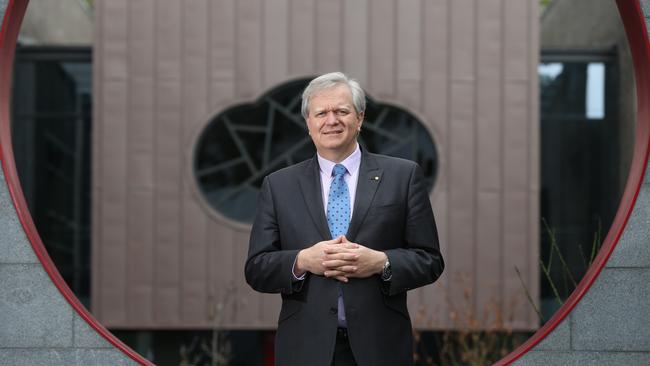In a world of colossal troubles, plucky ANU steps up
Universities were never more needed than they are now, says Australia’s most unusual vice-chancellor, the ANU’s Brian Schmidt.

In the battle against the coronavirus crisis Australia needs universities more than ever, but they possibly have never been more distrusted, Australian National University vice-chancellor Brian Schmidt said on Monday.
In his annual Foundation Day address to the ANU community Professor Schmidt said that all universities were proudly playing their part in dealing with the unfolding catastrophe.
They were leading public health policy, training health workers, researching vaccines, advising on the economic recovery, looking for future sources of prosperity and reassessing Australia’s place in a rapidly changing world, Professor Schmidt said to a small and well-spaced audience in the university’s Llewellyn Hall.
Read next: Uni pulls China article | UNSW stumbles over free speech | Melb Uni cuts 450 jobs | Hong Kong students rush for visas | Business visa funds can drive research |
“ANU and Australia’s three dozen other universities are among the most important assets Australia possesses, and investing in them is one of the best long-term decisions the nation can make,” he declared.
He made the case that ANU, established after World War II as the national research university, had a special role to play in dealing with the problems ahead: “a future where geopolitical uncertainty is threatening to place restraints on global free trade, where relations with our biggest trading partner could likely worsen, and where the erratic policy direction of our biggest security partner could cause us added trouble”.
“In the face of this, Australia will need to become more self-reliant for our security, more diverse in our economy, and more agile in our governmental responses to a rapidly changing environment,” he said.
But he admitted that universities faced a struggle to make a contribution that would be welcome by everyone. At this moment the work of universities “has also perhaps never been more distrusted”, he admitted.
Professor Schmidt didn’t offer any easy solution for universities to build trust, except to detail how universities were responding to the crisis. “I suspect few Australians realise just how large and direct a part ANU and other universities are playing in the fight against the pandemic,” he said.
One clear message in Monday’s address was that, for universities, small can be good. ANU is in that position itself, with less than half the students of Australia’s big five institutions — the universities of Sydney, NSW, Melbourne, Queensland and Monash University.
Professor Schmidt said ANU was the only comprehensive university in the world’s top 50 with an annual budget of less than $US1bn ($1.4bn). Yet four of Australia’s five university-based Nobel prizes were won at ANU, including his own for physics in 2011, although he didn’t mention the latter.
But it’s that which makes him a unique university leader, currently the only one in the world to hold a Nobel prize.
In an interview earlier this year with The Australian Professor Schmidt acknowledged the unusual choice he had made to become a vice-chancellor. After the Nobel award he wondered what would come next for him.
“You can swan around the world. That’s really interesting but at some point it does start losing the lustre and you start wondering: ‘God, am I just a show pony or am I actually going to do something?’ ” he said. In 2013 he started to think seriously about the future of ANU and he outlined his ideas in a speech at the end of that year.
When Ian Young, the university’s vice-chancellor at the time, indicated he would step down at the end of his term in 2015, Professor Schmidt had conversations with other people at ANU. “At some point I started thinking maybe this is a job I could do,” he said.
His approach was to put ANU on a different path from the big five research-intensive universities. He said he believed it was best not to pursue greater student numbers, which was difficult anyway because ANU did not have a large home city from which to draw students.
Professor Schmidt wants the university to produce excellent research, but from its small base. ANU had achieved this before, he said; ANU researchers basically founded the field of demography several decades ago.
One of the most important things ANU could do, he said, was to “be a place that Australian students can get an education as good as any place in the world but distinctively Australian”.
“I basically get no points for that in the (university) rankings,” he said. “And yet I know that every mum and dad and grandparent and aunt and uncle actually care about that, probably more than anything.”
When Professor Schmidt was developing his plan for ANU to excel without being large, he couldn’t have known how relevant it would be in 2020.
All Australian universities now are being forced to downsize because of the coronavirus and the loss of international students. This year ANU had a financial hole of $220m to fill because of the virus and the bushfires.
“During this crisis, universities have been among the hardest hit and least assisted of all Australian institutions,” Professor Schmidt said in his Monday speech.
But he also noted ANU’s unique heritage, having been founded to reconstruct Australia after a period of turmoil. Now he hopes ANU will do it again.




To join the conversation, please log in. Don't have an account? Register
Join the conversation, you are commenting as Logout